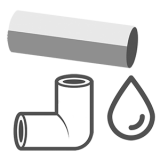| » » » |
The importance of controlling flies in a stable
Before diving into the solutions, it is essential to understand the importance of controlling fly populations in a stable. Flies can carry disease and cause skin irritation in horses. They can also disturb the behavior of horses and prevent them from resting and feeding properly. By maintaining a clean stable and using natural methods to control flies, you ensure a healthy and comfortable environment for your horses.
Clean the stable regularly
The first step in keeping flies away is to keep your stable spotlessly clean. Flies are attracted to decaying organic matter such as horse droppings, food scraps, and piles of wet hay. Be sure to clean boxes daily, remove waste, and sanitize feeders. Clean, dry straw in stalls will also reduce breeding grounds for flies.
Use natural repellents
Natural repellents are a great solution to keep flies away. You can make your own repellent spray by mixing citronella essential oil, eucalyptus oil, and water in a spray bottle. Spray this mixture on the coat of your horses and in the stable to repel flies in a natural way.
Effective repellents include pyrethrin-based fly repellent for use on all breeds of horses.
repellent plants
There are plants that have repellent properties against flies. Planting herbs like mint, basil and lavender around the stable can help deter flies. These plants give off aromas that act as natural repellents and improve the ambient air.
Use fly traps
Fly attractant traps can be an effective solution for trapping adult flies. You can create homemade traps by using plastic bottles and placing a bait made from apple cider vinegar, corn syrup, and pieces of fruit. Flies will be attracted to the sweet smell and will remain trapped in the bottle. Alternatively, you can use the fly attractant bag with pheromones to lure the fly into the bag filled with water.
Control the humidity in the stable
Flies thrive in moist environments. Be sure to maintain good drainage in and around the stable to avoid pools of standing water. Use fans to keep the air moving, as flies have difficulty flying in strong air currents.
Use screens and mosquito nets
Installing screens and insect screens on stable doors and windows can help keep flies out while allowing natural light and fresh air in. This creates a physical barrier for flies without using chemicals.
Provide outdoor shelter for horses
In addition to the stable, it is essential to provide outdoor shelter for your horses. Awnings or sheds can provide a shaded space where horses can protect themselves from flies when outside.
The use of beneficial nematodes
Beneficial nematodes are small organisms that feed on fly larvae present in the soil. Introducing them to wet areas around the stable can help reduce the fly population in the long run.
Appeal to predatory birds
Some species of birds, such as swallows, feed on flies and flying insects. Encourage the presence of these birds by installing nesting boxes around the stable.
By using these natural solutions, you can significantly reduce fly populations in your stable, provide a healthier environment for your horses, and improve the overall well-being of your equestrian facility. Opting for natural products is not only beneficial for the health of your horses, but also for the environment.
Do not forget that the key to successfully combating flies is perseverance and regularity in the implementation of these natural methods.
1. Are natural products as effective as chemical methods of fly control?
Yes, natural products can be just as effective as chemical fly control methods, especially when used correctly and in combination with other strategies. While chemical-based solutions can offer immediate results, natural products can provide long-lasting, long-lasting fly control without the potential risks associated with harsh chemicals.
2. Can I use essential oils directly on my horses?
It is important to dilute essential oils well before applying them to horses or their environment. Direct application of undiluted essential oils may cause skin irritation or sensitivities. Consult a veterinarian or experienced equine professional to determine the proper dilution rate and safe application methods for your specific horse.
3. How often should I clean the stable to minimize fly attraction?
Regular cleaning and manure removal are essential to reduce the attraction of flies to barns. Try to clean the barn at least once a day, focusing on removing manure, soiled bedding and any rotting organic matter. This practice helps eliminate fly breeding grounds and minimizes the presence of flies in the barn.
4. Can I use multiple fly control methods simultaneously?
Yes, implementing multiple fly control methods simultaneously can improve their effectiveness. Combining natural products, such as essential oils or sticky traps, with physical barriers like mosquito nets and practicing good, stable hygiene can create a comprehensive approach to fly control. By adopting a multi-faceted strategy, you can target flies from multiple angles and improve overall fly management in your stable.





























































